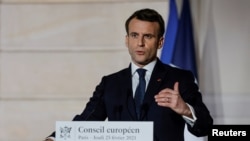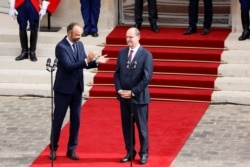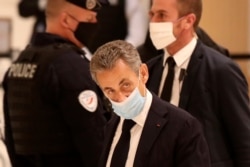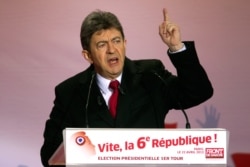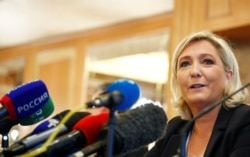French President Emmanuel Macron is being pulled in contrary political directions, swerving both left and right, as he seeks to work out the political trajectory most likely to secure him reelection next year, according to critics and analysts.
The maneuvering, though, is increasing the frustrations of left-wing voters amid signs that a backlash is building. Libération, France's leading left-wing daily newspaper, warned this week that many on the left, who backed Macron in 2017, handing him a landslide election win over France's far-right leader Marine Le Pen, won't do so again next year.
Libération accused Macron of being in "flagrant denial," saying the French president is "playing with fire" by assuming the left is going to mobilize and vote for him if he again faces Le Pen in a runoff.
Macron is coming under pressure from Le Pen, according to opinion polls, with the far-right leader having closed the gap between them to just 4 percent in a recent survey of voting intentions. Lockdown frustrations and an agonizingly slow rollout of coronavirus vaccines appears to be fueling Le Pen's support.
In 2017, Macron, a centrist outsider and former investment banker, who served as a minister in socialist President François Hollande's government, was an electoral novice who came from nowhere, founded his own party from scratch and snatched the presidency by crushing Le Pen in a 66 percent to 34 percent victory.
He was helped by crumbling traditional party allegiances, anti-establishment disdain and a squabbling left wing.
Last year, Macron suffered a political reversal when a cabal of mainly left-oriented lawmakers defected from his party, La République En Marche, depriving him of an absolute parliamentary majority. Their defection did not dissuade Macron from continuing a lurch to the right — a move designed to ensure center-right voters remain loyal.
He swapped out two center-right politicians as prime minister, replacing Edouard Philippe, a potential presidential rival next year, with Jean Castex, a largely unknown civil servant with little political experience and someone not seen as an electoral cahallenger to Macron.
Élysée Palace aides say Macron's best hope of winning a second term in 2022 is to convince voters the choice comes down to him or the far right. He has the benefit of there being no standout from the left or center-right among a field of mediocre would-be presidents — although Philippe remains a potential threat.
A possible center-right challenge from Nicolas Sarkozy evaporated this week when the former prime minister was found guilty on corruption charges, dashing any thoughts he might have been entertaining of making a political comeback.
Last year, Macron acknowledged in a television interview that he remains unpopular among large parts of the electorate, conceding that in his first three years in office he had alienated some voters because they perceived him as being out of touch with ordinary families.
His concession came after an ugly incident during a walk in the Tuileries Garden in Paris with his wife and their bodyguards, when he was confronted by anti-government yellow-vest protesters, who the day before had demonstrated in favor of a large increase in funding for hospitals and health workers.
They accused the French leader of being responsible for police violence against protesters. They chanted for the president to resign, and he complained they were interrupting his walk.
Jean-Luc Mélenchon, leader of the left-wing France Insoumise party, a likely presidential candidate next year, cited the clash as further evidence of a "decline in the relationship between the president and the people."
In the past few months Macron has been lurching to the right, a swerve, say analysts, based on the assumption by the Élysée Palace that the left would have no option but to vote for him next year. Instead, the focus has been on appealing to the right by toughening Macron's stance on law-and-order issues.
But a promised clampdown on "Islamist separatism," part of a bid to woo conservative voters who might be tempted to back Le Pen, has prompted growing unease on the left and center of French politics, seemingly prompting him to swing back and forth from criticizing multiculturalism to embracing racial and cultural diversity.
A proposed tough security law, which critics said would shield police from accusations of misconduct by outlawing the sharing of images of officers when they are operational, provoked outrage with tens of thousands protesting in the streets.
The government appeared taken aback by the strength of feeling over the draft measure. And Macron effected a U-turn, instructing his ministers to rewrite the law completely.
Macron has seen some benefits from his emphasis on law and order, and also from his much tougher rhetoric on illegal immigration, with steady improvements in his popularity ratings. But he and his government have been buffeted by public disapproval of the handling of the coronavirus pandemic, with 60 percent of the public deeming it to have been incompetent, according to a poll published last month.
Le Pen has been on the attack, accusing the government of acting "like a dead dog floating along in the water" in its handling of the pandemic.
In a recent radio interview she said: "We have the feeling of being knocked around without ever anticipating, without ever looking ahead, without ever taking the decisions that allow us to avoid, when it's possible, lockdown number 1, number 2 or number 3."
Macron's green credentials also have been challenged. On Wednesday, a new climate bill sent to parliament was criticized by environmental groups. They say it is not radical enough to see France meet its goals for cutting emissions. The draft measure, which incorporates many recommendations from citizens assembly of 150 randomly chosen citizens guided by experts, aims to cut French carbon emissions by 40 percent in 2030 from 1990 levels.
The Élysée Palace says the proposed measure will lead voters to conclude the French president is serious about fulfilling a pledge to "make our planet great again."




